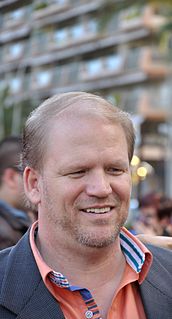A Quote by Jason Fried
You cannot ask somebody to be creative in 15 minutes and really think about a problem. You might have a quick idea, but to be in deep thought about a problem and really consider a problem carefully, you need long stretches of uninterrupted time.
Related Quotes
I am not keen on the idea of an oversharer. I don't like that as a problem. I have more of a problem with an undershare. If I'm talking to somebody and I ask them how their love life is and they say "fine," that's a problem for me. I want to know things about people, I feel like we're all here on this planet, and intimacy is important.
Obviously cheap sentimentality isn't something any good novelist wants to traffic in, but I think it's a problem if you consider it to be the most egregious of all creative sins. I think it's a problem if you consider it the thing to be avoided at all cost. I think it's a problem of you're not willing to risk the consequences of that kind of emotionalism under any circumstances. Then you wind up in the cul-de-sac of irony.
Macho in a different sense, the kind of things that we think makes us a man. It doesn't really exist right now. I really don't want it to seem that I think it's a problem that women are in development, I don't think it's as problem at all, I just think it's an interesting time that we're in. And maybe long overdue - maybe television for a long time was made for men and it's long overdue.
You know how it always is, every new idea, it takes a generation or two until it becomes obvious that there's no real problem. It has not yet become obvious to me that there's no real problem. I cannot define the real problem, therefore I suspect there's no real problem, but I'm not sure there's no real problem.
When you start looking at a problem and it seems really simple, you don't really understand the complexity of the problem. Then you get into the problem, and you see that it's really complicated, and you come up with all these convoluted solutions. That's sort of the middle, and that's where most people stop... But the really great person will keep on going and find the key, the underlying principle of the problem - and come up with an elegant, really beautiful solution that works.
Cities are never random. No matter how chaotic they might seem, everything about them grows out of a need to solve a problem. In fact, a city is nothing more than a solution to a problem, that in turn creates more problems that need more solutions, until towers rise, roads widen, bridges are built, and millions of people are caught up in a mad race to feed the problem-solving, problem-creating frenzy.
It is hard to communicate understanding because that is something you get by living with a problem for a long time. You study it, perhaps for years, you get the feel of it and it is in your bones. You can't convey that to anyone else. Having studied the problem for five years you may be able to present it in such a way that it would take somebody else less time to get to that point than it took you. But if they haven't struggled with the problem and seen all the pitfalls, then they haven't really understood it.
If we want to impact hundreds - or millions - of people, we have to do things differently. If we look at the problem as an infrastructural problem, we cannot make an impact because it requires a lot of effort. But when we convert this problem into a knowledge problem, suddenly the problem is manageable.
The problem facing humanity today is not a political problem; it's not a financial problem; it's not a military problem. It's obviously a spiritual problem. That is, it has to do with what we believe to be true about who we are, where we are, why we are where we are, and what are we doing on the Earth. What is the purpose of life itself? What we need right now are leaders or models, people who will stand up and not only help to write a cultural story, but help to model it in the way that they interact with each other.
Abraham Maslow taught me, that when you're working with a patient, never let them spend more than a few moments on the problem, because what you think about is what expands, and if they're talking about the problem all the time, when they leave your session, the problem will expand. Get 'em to put their attention on what they intend to create, or on solutions.


































